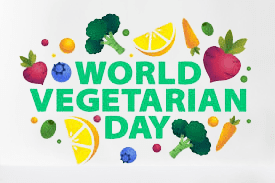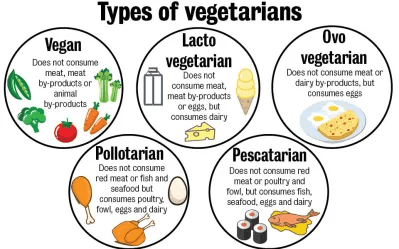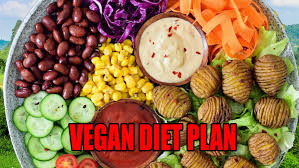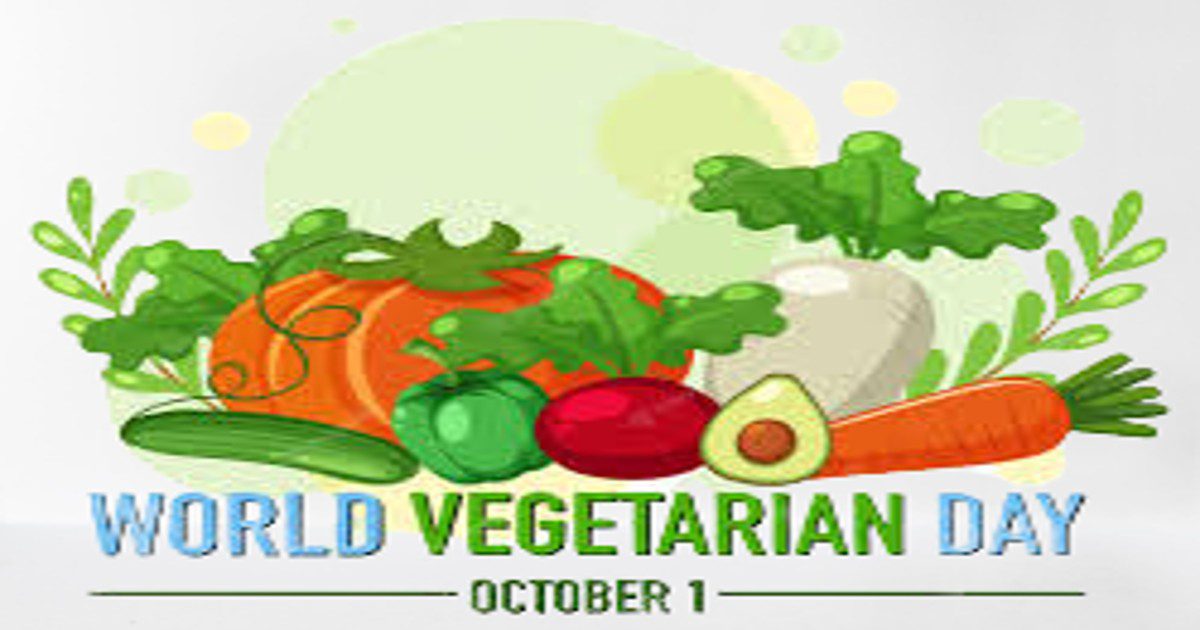World Vegetarian Day: World Vegetarian Day was founded in 1977 by the North American Vegetarian Society (NAVS) and was endorsed by the International Vegetarian Union in 1978. October 1st is the annual kick-off of Vegetarian Awareness Month. Hence the month of October is considered as Vegetarian Awareness Month. World Vegetarian Day 2023 will be observed on 1st October, Sunday.
World Vegetarian Day
Vegetarian Diets
- Reduce the risk of major killers such as heart disease, stroke and cancer while cutting exposure to foodborne pathogens
- Provide a viable answer to feeding the world’s hungry through more efficient use of grains and other crops
- Save animals from suffering in factory-farm conditions and from the pain and terror of slaughter
- Conserve vital but limited freshwater, fertile topsoil and other precious resources
- Preserve irreplaceable ecosystems such as rainforests and other wildlife habitats
- Decrease greenhouse gases that are accelerating global warming
- Mitigate the ever-expanding environmental pollution of animal agriculture

October is dedicated to vegetarians and it also encourages more and more people to turn towards vegan foods since it is good for their health and the environment in general. The vegetarian diet contains plant-based foods that are thoroughly enjoyed by the people and have various yummy options as well.
World Vegetarian Day – Significance
It’s estimated that there are 1.5 billion vegetarians on the planet today. Not all of those people are vegetarian by choice. Some don’t have access to meat, and for others it’s simply too expensive. But for a lot of people – approximately 75 million worldwide – vegetarianism is a lifestyle choice. These vegetarians often choose a veggie diet for ethical, environmental or health reasons. World Vegetarian Day, which takes place on 1 October every year, promotes and raises awareness of the benefits of a vegetarian lifestyle.
A vegetarian eats no meat at all, including white meat (like chicken, turkey, etc.) or fish. Some people follow a semi-vegetarian diet. For example a ‘pescatarian’ is someone who eats no meat, but does eat fish and seafood. Other people call themselves ‘flexitarian’ – they are mainly vegetarian but allow themselves an occasional meat dish. Vegans, on the other hand, don’t eat or use any animal products at all – for example they don’t eat eggs, cheese or honey.
Many vegetarians and vegans choose not to eat meat or animal products for ethical and environmental reasons. Often they are unhappy about the bad treatment of animals. Industrial farming for meat, milk and eggs often means that animals don’t have enough space to move around, they don’t have enough contact with other animals and they never go outdoors.
Many people are worried about the effects of meat and fish production on the environment. Livestock farming produces more carbon emissions than the emissions from cars, planes, ships and all other transport put together. In addition to this, it uses a huge amount of the planet’s land and water resources. Many people see plant-based diets as the only sustainable option for the future.
Some people choose a vegetarian lifestyle to improve their general health. According to the Vegetarian Society, a meat-free diet could help reduce the risk of certain cancers and the possibility of heart disease, as well as other health problems such as obesity and high blood pressure.
Of course, being vegetarian doesn’t simply mean cutting out certain foods from your diet. To ensure that your body gets all the protein, vitamins, etc. that it needs, it’s important to replace animal products with a good variety of foods like nuts, tofu, lentils, seeds, grains, cereals and vegetables.
Today, World Vegetarian Day is celebrated in more than 180 countries around the world. It is also recognized as a national day in several countries, including Brazil, China, France, and Thailand.
World Vegetarian Day initiates the month of October as Vegetarian Awareness Month, which ends with November 1, World Vegan Day, as the end of that month of celebration.
What Is a Vegan Diet or Vegan Food?
If you invite a dinner guest who’s a vegan, you’ll want to check your menu carefully to make sure it follows two basic rules. Foods from plants are OK, but foods from animals are off limits, including common ingredients like eggs, cheese, milk, and honey.
About 3% of Americans follow vegan foods . Their reasons for eating this way vary. Some vegans do it to improve their health. A plant-based diet could lower the risk for certain diseases. Others stay away from meat because they don’t want to harm animals or because they want to protect the environment.
What You Can Eat
On a vegan diet, you can eat vegan foods made from plants, including:
- Fruits and vegetables
- Legumes such as peas, beans, and lentils
- Nuts and seeds
- Breads, rice, and pasta
- Dairy alternatives such as soymilk, coconut milk, and almond milk
- Vegetable oils
What You Can’t Eat
Vegans can’t eat any foods made from animals, including:
- Beef, pork, lamb, and other red meat
- Chicken, duck, and other poultry
- Fish or shellfish such as crabs, clams, and mussels
- Eggs
- Cheese, butter
- Milk, cream, ice cream, and other dairy products
- Mayonnaise (because it includes egg yolks)
- Honey
Health Benefits
Studies show that vegans have better heart health and lower odds of having certain diseases. Those who skip meat have less of a chance of becoming obese or getting heart disease, high cholesterol, and high blood pressure. Vegans are also less likely to get diabetes and some kinds of cancer, especially cancers of the GI tract and the breast, ovaries, and uterus in women.
According to a 2019 article in The Economist, 25% of 25- to 34-year-old Americans say they are vegans or vegetarians. And interest in vegan foods hit an all-time high in 2020, according to a report by the food-focused website Chef’s Pencil.
For some, shunning dairy, meat and other animal products may seem like an extreme sacrifice. For others, the personal and societal benefits associated with vegan foods make the choice a no-brainer; for instance, many people care deeply about the welfare of animals. The potential health benefits alone inspire many to switch.
But is a vegan diet or vegan food really that healthy?
Research has shown that a vegan diet or vegan foods can help do the following:
- Promote weight loss
- Reduce your risk of heart disease by lowering cholesterol levels
- Lower your chances of getting certain types of cancer, such as colon cancer
- Manage diabetes by lowering A1C levels
The key: Planning
“Refined grains, sweets and junk food are troublemakers for everyone, not just vegans,” Soble cautions. “And vegans and nonvegans alike can fall into the habit of making these items the mainstays of their diet.”
To have a healthy diet of any kind, you need important nutrients. While many of these may have been plentiful when you ate dairy and meat, you’ll need to find new ways to incorporate them into your diet as a vegan.
- Protein: Animals aren’t the only sources of protein. Soy products (e.g., tofu and edamame) are also packed with protein. Other good sources include seitan (made from gluten), chickpeas, lentils and nutritional yeast.
- Vitamin B12: A lack of vitamin B12 can make you feel tired and weak. Getting enough vitamin B12, though, can be challenging for vegans because it can’t be found in plants. To get your fill, stock up on fortified cereals, fortified rice and soy drinks — or take a supplement. The recommended daily amount for most adults is about 2.4 milligrams, but check with your doctor to see what’s right for you.
- Essential fatty acids: A lack of essential fatty acids has been associated with problems related to brain heath, such as cognitive impairment and depression. To get your essential fatty acids, pile up the whole grains and leafy green vegetables (e.g., kale, spinach and collards). And try snacking on a small handful of unsalted nuts, like almonds, walnuts or pistachios (just watch your portions; nuts are high in calories).
- Iron: Red meat and egg yolks reign as the richest sources of iron. But they also are high in cholesterol. Good plant sources of iron include black-eyed peas, tofu and dried fruits (fresh fruit has iron, too, you just get more iron from dried fruit because you eat more).
- Vitamin D: Ten to 15 minutes of sunlight exposure a day can give you a vitamin D boost, as can fortified orange juice and soy.
Health benefits of Vegetarian Diet
For people looking to lose weight, a vegan diet or vegan foods can help. Eating vegan foods may also help you maintain your heart health. What’s more, this diet may offer some protection against type 2 diabetes and certain cancers.

This article examines the science behind the potential benefits of vegan diets or vegan foods. We’ll highlight some recipe ideas that feature the versatility of plant-based, whole food eating. And if you’re wondering how a vegan diet differs from a vegetarian one, we’ll cover that, too.
- whole grains
- fruits
- vegetables
- beans
- peas
- nuts
- seeds
Since these foods make up a larger portion of a vegan diet than a typical Western diet, they can lead to a higher daily intake of certain beneficial nutrients.
Several studies have reported that vegan diets tend to provide more fiber, antioxidants, and beneficial plant compounds. They also appear to be richer in potassium, magnesium, folate, and vitamins A, C, and E
Vegan diets even appear to be higher in iron. However, the form of iron that plants provide is not as bioavailable — meaning, your body is not as able to absorb it — as the form found in animal foods
Yet, not all vegan diets are created equal.
For instance, poorly planned vegan diets or vegan foods may not provide sufficient amounts of vitamin B12, niacin, riboflavin (vitamin B2), vitamin D, calcium, iodine, selenium, or zinc
That’s why it’s essential to choose whole plant foods and fortified foods as vegan foods. You may need to consider supplements for nutrients such as vitamins B12 and D, zinc, and calcium, since these may be lacking in a vegan diet.
Eating vegan foods can help you lose excess weight
An increasing number of people are turning to plant-based diets in hopes of shedding excess weight. While there’s no guarantee that a vegan diet will lead to weight loss, there may be some good reasons to give it a try.
Many observational studies suggest that vegans tend to be thinner and have lower body mass indexes (BMIs) than nonvegans.
In addition, several randomized controlled studies — the gold standard in scientific research — report that vegan diets are more effective for weight loss than the diets they are compared with.
Findings include:
- A small study found that people eating a low fat, high fiber vegan diet lost more weight than those eating a conventional low fat diet.
- Participants following a vegan diet lost an average of 13 lbs (6 kg) over 16 weeks, while those following the Mediterranean diet did not see any weight loss.
- Vegan eaters also lost more weight in a study than people who included meat or fish in their diets. Vegetarians lost just as much weight as vegans in this study.
- When comparing a low fat, whole food vegan diet to a standard omnivorous diet over 16 weeks, the vegan diet resulted in an average of 13 lbs (6 kg) of weight loss. People eating their regular diets did not experience significant weight loss.
What’s more, a small study comparing the weight loss effects of five different diets concluded that vegetarian and vegan diets were just as well-accepted as semi-vegetarian and standard Western diets
Even when study participants weren’t following the diets perfectly, the people in the vegetarian and vegan groups still lost more weight than those on a standard Western diet.
A vegan diet appears to lower blood sugar levels and improve kidney function
A vegan diet may also provide benefits for type 2 diabetes and declining kidney function.
Indeed, vegans tend to have lower blood sugar levels and higher insulin sensitivity and may have a lower risk of developing type 2 diabetes
Even if you don’t go fully vegan, increasing your intake of healthy plant-based foods and decreasing your intake of meat- and dairy-based foods may reduce your type 2 diabetes risk
Lower risk of diabetes complications
In general, a vegan diet is thought to lower the risk of complications for people with type 2 diabetes.
People with diabetes who substitute plant protein for meat may reduce their risk of poor kidney function, but more research is needed on this topic.
Going vegan may protect against certain cancers
According to the World Health Organization, at least one-third of all cancers can be prevented by factors within your control, including diet with vegan foods.
Benefits of eating more plant foods
Vegans generally eat considerably more legumes, fruits, and vegetables than nonvegans. This may explain why a 2017 study found that vegans may benefit from a 15% lower risk of developing cancer
For instance, eating legumes regularly may reduce your risk of colorectal cancer by 9–18%
And according to the National Cancer Institute, eating higher amounts of plant-based foods reduces your risk of several types of cancer, including stomach, lung, mouth, and throat cancers
It may also reduce the risk of colon, prostate, and pancreatic cancers.
What’s more, vegan diets or vegan foods generally contain more soy products, which may offer some protection against breast cancer
Benefits of avoiding meat
Avoiding certain animal products may also help reduce the risk of prostate, breast, stomach, and colorectal cancers. Red meat, smoked meat, or processed meats and meats cooked at high temperatures are thought to promote certain types of cancers
Effects of avoiding dairy
Vegans also avoid dairy products, which some studies suggest may slightly increase the risk of prostate cancer
On the other hand, there is evidence that dairy may help reduce the risk of other cancers, such as colorectal cancer
So, avoiding dairy may not be the factor that lowers vegans’ overall risk of cancer.
It’s important to note that these studies are observational. They make it impossible to pinpoint the exact reason vegans have a lower risk of cancer.
A vegan diet is linked to a lower risk of heart disease
Eating fresh fruits and vegetables, legumes, and fiber is linked to a lower risk of heart disease
Well-planned vegan diets generally include all these foods in amounts higher than the standard Western diet.
Observational studies comparing vegans with vegetarians and non-vegetarians report that vegans may benefit from up to a 75% lower risk of developing high blood pressure
Vegans or people eating vegan foods may also have a lower risk of dying from heart disease, though more studies are needed to understand the relationship
What’s more, several randomized controlled studies report that vegan diets are much more effective at reducing blood sugar, LDL (bad) cholesterol, and total cholesterol levels than the diets they are compared with
This may be particularly beneficial to heart health, since reducing high blood pressure, cholesterol, and blood sugar levels may reduce the risk of heart disease by as much as 46%
A well-balanced vegan diet or vegan food includes plenty of whole grains and nuts, both of which are good for your heart
Types of vegetarian diets
Vegetarian diets vary in what foods they include and exclude:
- Lacto-vegetarian diets exclude meat, fish, poultry and eggs, as well as foods that contain them. Dairy products, such as milk, cheese, yogurt and butter, are included.
- Ovo-vegetarian diets exclude meat, poultry, seafood and dairy products, but allow eggs.
- Lacto-ovo vegetarian diets exclude meat, fish and poultry, but allow dairy products and eggs.
- Pescatarian diets exclude meat and poultry, dairy, and eggs, but allow fish.
- Vegan diets or vegan foods exclude meat, poultry, fish, eggs and dairy products, as well as foods that contain these products.

Some people follow a diet that is mostly plant-based, but they still eat meat, dairy, eggs, poultry and fish on occasion or in small quantities. This is sometimes called a flexitarian diet.
Vegetarian Diet Plan
To get the most out of a vegetarian diet, choose a variety of healthy plant-based foods. These include whole fruits and vegetables and whole grains. Nuts and legumes, such as lentils, beans and peanuts, also are considered healthy plant-based foods.

At the same time, cut back on less healthy choices. These include sugar-sweetened beverages, fruit juices and refined grains. A registered dietitian can help you create a vegetarian plan or list of vegan foods that’s right for you.
Keep in mind that the more foods you cut out of your diet, the harder it can be to get all the nutrients you need. A vegan diet or vegan food, for example, cuts out natural food sources of vitamin B-12, as well as milk products, which are good sources of calcium.
To be sure that your diet (vegan foods) provides what your body needs, pay special attention to the following nutrients:
Calcium and vitamin D
Calcium helps build and maintain strong teeth and bones. Milk and dairy foods are highest in calcium. Dark green vegetables are good plant sources if you eat enough of them. Examples include turnip and collard greens, kale and broccoli. Other options include calcium-enriched and fortified products. Calcium is added to some juices, cereals, soy milk, soy yogurt and tofu.
Vitamin D also plays an important role in bone health. Vitamin D is added to cow’s milk, some brands of soy and rice milk, and some cereals and margarines. Be sure to check food labels. People who don’t eat enough fortified foods and have limited sun exposure may want to talk with a health care provider about vitamin D supplements. Plant-derived vitamin D supplements are available.
Vitamin B-12
Vitamin B-12 is necessary to produce red blood cells and prevent anemia. Anemia a condition in which the body doesn’t have enough healthy red blood cells to carry oxygen to all parts of the body. Vitamin B-12 is found almost exclusively in animal products, so it can be difficult to get enough B-12 on a vegan diet. Vitamin B-12 deficiency may go undetected in people who eat a vegan diet. This is because the vegan diet is rich in a vitamin called folate that can mask vitamin B-12 deficiency. For this reason, it’s important for vegans to consider vitamin supplements, vitamin-enriched cereals and fortified soy products.
Protein
Protein helps keep skin, bones, muscles and organs healthy. Eggs and dairy products are good sources, and you don’t need to eat large amounts to meet your protein needs. Eating a variety of plant-based foods throughout the day also can provide enough protein. Plant sources include soy products and meat substitutes, legumes, lentils, nuts, seeds, and whole grains.
Omega-3 fatty acids
Omega-3 fatty acids are found in fish, canola oil, soy oil, walnuts, ground flaxseed and soybeans. Vegetarian diets that do not include fish may be low in two types of omega-3 fatty acids called DHA and EPA. Some evidence suggests that taking in EPA and DHA omega-3 fatty acids may lower the risk for heart disease. Also, these two omega-3s may be important during pregnancy for fetal development. Research on other health effects of EPA and DHA varies. Vegetarians who do not eat fish or include sources of omega-3 fatty acids in their diet may consider adding fortified products to their diet.
Iron and zinc
Iron is important to red blood cells. Dried beans and peas, lentils, enriched cereals, whole-grain products, dark leafy green vegetables, and dried fruit are sources of iron. But the body doesn’t absorb iron from plant sources as easily as animal sources. So the recommended intake of iron for vegetarians is almost double that recommended for nonvegetarians. To help your body absorb iron from plants, eat foods rich in vitamin C at the same time as you’re eating iron-containing foods. Vitamin C-rich foods include peppers, strawberries, citrus fruits, tomatoes, cabbage and broccoli.
Like iron, zinc is not as easily absorbed from plant sources as it is from animal products. Fish, including crab and shrimp, are sources of zinc for pescatarians. Cheese and yogurt are sources of zinc if you eat dairy products. Plant sources include whole grains, soy products, lentils, beans, nuts and wheat germ. Zinc helps the body make proteins and grow cells. Research on zinc in the diet has found that it supports the immune system and vision, specifically.
Iodine
Thyroid hormones are made partly of iodine. Thyroid hormones help control the body’s metabolism and play an important role in muscle growth. Iodine can easily be added to food by using iodized salt. Seafood and dairy also are sources of iodine. People who do not eat seafood or dairy may be at risk of iodine deficiency if they do not use iodized salt. Iodine deficiency can lead to the thyroid getting bigger as it tries to meet the body’s need for thyroid hormones. When that happens to the thyroid it’s called goiter. Seaweed is vegan food for dietary iodine.
Getting started
One way to start on a vegetarian diet or vegan foods is to slowly reduce the meat in your diet. At the same time, increase the amount of fruits and vegetables in your diet. Here are a few tips to help you get started:
- Ramp up. Each week increase the number of meatless meals you already enjoy, such as spaghetti with tomato sauce or vegetable stir-fry. Find ways to include greens in your daily meals. Good options include spinach, kale, Swiss chard and collards.
- Substitute. Take favorite recipes and try them without meat. For example, make vegetarian chili by leaving out the ground beef and adding an extra can of black beans. Or make fajitas using extra-firm tofu rather than chicken. You may be surprised to find that many dishes need only simple changes to become vegetarian.
- Branch out. Check the internet for vegetarian menus. Buy or borrow vegetarian cookbooks. Check out ethnic restaurants to sample new vegetarian cuisines. Adding variety to your vegan food can help you meet all your nutritional needs.
